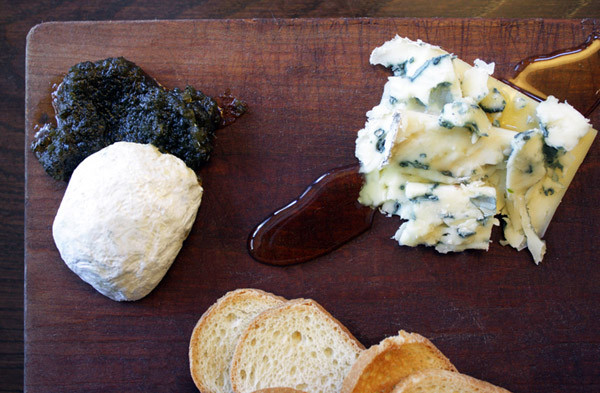✕

Column: industry Tag: food waste,hotels,pilot program Published: 2017-06-23 16:23 Source: Author:

A cheese board at the South Water Kitchen at the Kimpton Hotel Monaco Chicago features recycled kale jam. (Photo: Kimpton Hotel Monaco Chicago)
GLOBAL REPORT—The World Wildlife Fund (WWF), American Hotel & Lodging Association (AH&LA), and The Rockefeller Foundation are nearing the end of a 12-week series of pilot programs that began in March, working with 12 branded and independent properties across the United States to reduce food waste. While formal results of the program have not yet been released, new efforts are emerging at hotel restaurants worldwide to lower food waste and adopt a revamped mindset to how food is used in general.
“We have been developing best practices, and determining what sustainability means for this industry, as part of an effort to be a good global citizen,” said Brad Aldrich, AH&LA’s SVP of business development and liaison to the organization’s sustainability and food and beverage committees. These AH&LA committees worked directly on the pilot program, which included Hilton, Hyatt Hotels Corporation, InterContinental Hotels Group, Marriott International and Hershey Entertainment & Resorts.
Measuring is key
A key focus of the initiative included careful baseline measurements and separating of food waste, as a basis for understanding how much food is really needed in hotel kitchens, said Pete Pearson, director of food waste at the WWF. Much of the focus was on buffets, where there is often a lot more waste compared to plated meals, he said.
“You want to lower the gap between what you buy and what you actually serve,” Pearson said. He noted that hotels and restaurants produce an estimated 5 to 7 million tons of food waste out of the 63 million tons of food waste generated annually in the United States.
The initiative also included training of hotel staffs—from sales departments to stewarding employees to catering staff—on how to minimize food waste, as well as working with chefs to develop more zero-waste menus.
Spreading awareness
The 1,780-room Sheraton New York Times Square Hotel introduced a composting program to the employee cafeteria in April. The hotel employs more than 1,000 associates, who typically eat in the cafeteria at least once daily, said Executive Chef Joe Fontanals.
The hotel also is spreading awareness in the cafeteria on how to properly dispose of waste, the chef said. A table near the cafeteria exit displays the proper procedures for disposing waste in three stages: first food waste, then trash, then recyclables.
Prior to the launch of this employee cafeteria program, the sustainability-minded property already was sending kitchen fryer oil to an off-site recycling facility and wet kitchen waste to a composting site.
“As the third-largest hotel in New York City, we make tremendous efforts to reduce our carbon footprint and have many programs in place that contribute to our green hotel practices,” Fontanals said. “We compost 40 tons of wet waste annually, and the renewed composting effort in our associate cafeteria will increase our recycling efforts measurably.”
Drying up food
In Hawaii, the 290-room Andaz Maui at Wailea Resort has a food dehydrator, which processes all organic material (including fruit, vegetables, starches, fish and meat), said Paul Roberts, director of engineering at the resort.
This system dries food and other organic waste using heat and mechanical mixing. Food wastes have a very high moisture content—as much as 98%—and the weight and volume reduction are achieved by evaporation of the water, Roberts explained. Traceable vegetable and fruit waste can even be processed to produce feedstock for animals.
Being innovative
The South Water Kitchen restaurant at the 191-room Kimpton Hotel Monaco Chicago uses recycled food items in unique and different ways, said Chef Roger Waysok. For instance, sirloin steak is rubbed with recycled cold brew coffee grounds. The restaurant also features such items as kale jam made from leftover juice pulp (among other ingredients) and citrus marmalade also made from juice pulp and other foods/spices.
“We wanted to be creative and reduce waste at the same time,” he said. “I recommend that hotels try to keep an open mind when coming up with ideas for reducing food waste.”
Waysok noted that the use of recycled coffee grounds to season sirloin steak actually was suggested by one of the restaurant’s 64 employees in a contest held last summer that challenged the staff to come up with new ways to minimize waste of all kinds.
Offering homemade and home-grown appeal
In Anji, China, in the province of Zhejiang, the Alila Anji hotel sun-dries its fruits and vegetables, smokes and dries its own meats and fish, pickles vegetables and creates in-hose marmalades, GM Marco den Ouden said.
The 74-unit resort also separates compostable waste and has reduced the need for watering plant beds by creating a top layer of woodchips. This is part of Alila Hotels & Resorts’ goal to become a zero-waste hotel brand—an initiative that began last year.
Den Ouden recommended that other properties reduce the number of items on their fixed menus and vary specials, based on supplier offers and seasons, to lessen food waste.
“What we are doing reduces waste, and at the same time, offers quality,” he said. “Guests love fresh and homemade food items, and are willing to pay a premium for homemade freshness.”
Previous:5 factors propelling hotel distribution
Next:Demand growth expected to boost Canada’s hotels in 2017
Hot key words
Hot Products
Popular Vendors